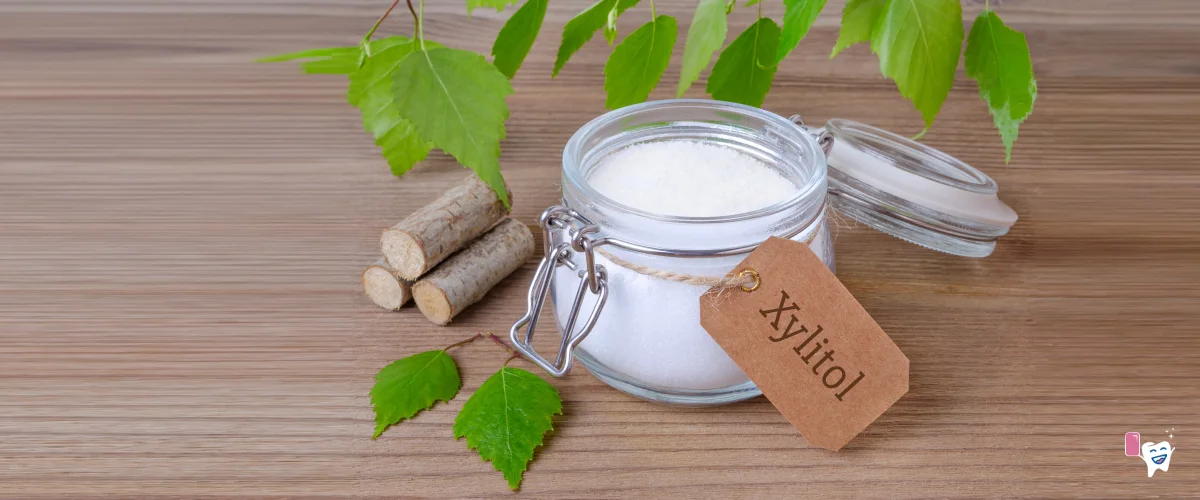Xylitol is a natural sweetener that is considered the best substitute for classic (refined) sugar. It is a sugar that occurs naturally in nature. And this also corresponds to what science has found out about him so far. It is the best sugar substitute that has no competition. Xylitol, or birch sugar, is extracted from birch trees or certain types of fruit. Unlike traditional sugar, Xylitol helps your teeth to avoid tooth decay. It has many health benefits. Therefore, we recommend consuming sugar-free chewing gum with xylitol (only with it). Not every chewing gum with xylitol contains only itself. Manufacturers often put other artificial sweeteners in there as well.
Other artificial sweeteners found in chewing gum do not have such health benefits. On the contrary. Manufacturers often add artificial sweeteners to chewing gum with xylitol, which have a negative effect on human health. And that is the reason why we want to draw attention to it. What is beneficial for producers may not necessarily be beneficial for consumers.
Functions | Use | Dental benefits | Another benefits | Disadvantages | Study confirming the health benefits
What is Xylitol (E967)? | Natural sweetener
Xylitol [1] is a natural sweetener found in nature in hardwoods, straw, berries (plums, raspberries and strawberries), rice, sugar cane, various fruits and vegetables. It also occurs naturally in the human body. An adult’s body produces up to 15 grams of xylitol per day.
Xylitol is a sweetener that does not harm the body. When using it, there are no side effects and bad effects on the heart and blood vessels, it does not cause obesity. It belongs to the group of sugar alcohols. Also called wood sugar or birch sugar. It used to be made of birch wood. It is now obtained from vegetable hemicellulose (from corn, raspberries, plums). Mainly produced in China [2]. The name xylitol comes from the Greek word “xyl“, which means wood, and the suffix “-itol” indicating sugar alcohols.
Functions of xylitol
Xylitol has the function of a sweetener, but also a stabilizer, humectant or filler in low-calorie foods [3].
Use of xylitol
It creates a pleasant cooling sensation on the tongue, which is why it is used in chewing gum.
Used as an ingredient in chewing gum, candies, ice creams, chocolates, jams, various pastilles, as a filler in low-calorie foods or as a table sweetener. It is also used in toothpastes due to its positive effects on tooth decay.
The use of xylitol is very suitable for diabetics who have to monitor their blood sugar level, as it has a low glycemic index. The glycemic index (GI) is the value by which the blood sugar level rises after eating a meal containing carbohydrates, and then decreases again as soon as insulin takes care of the transport of the received sugar into the cells. Unlike regular sugar, xylitol is absorbed more slowly, so it does not result in hyperglycemia caused by insufficient insulin response.
It is also suitable for a low carb diet and can also be suitable for people prone to tooth decay or other problems in the oral cavity, such as frequent gingivitis or canker sores.
Very easy to use in the kitchen. It can be used as a 1:1 substitute for sugar.
Dental benefits of the natural sweetener Xylitol
- Studies have shown that xylitol has a number of dental benefits for our teeth (Healthy Teeth with Chewing Gum) and that it helps improve our oral health in a variety of ways
- The advantage of xylitol is its property, where it does not have a negative effect on the teeth, on the contrary, it is very beneficial.
- Chew healthy chewing gum only with xylitol after meals. Dentists recommend it as an alternative to brushing your teeth during the day (but it does not replace brushing your teeth twice a day in the morning and in the evening – it is only a suitable supplement).
- It has an antimicrobial property. It does not support the growth of bacterial cells, which is why it is used in dentistry.
- Xylitol makes it harder for bacteria to stick to and multiply in plaque bacteria on our teeth – therefore helping to reduce the risk of tooth decay.
- It promotes remineralization – the vital minerals in our saliva reintegrate into weakened tooth enamel – this helps stop the growth of cavities and prevent new ones from forming.
- It increases the activity of white blood cells to fight bacteria, which helps prevent gum disease and bad breath.
Another benefits
- Regular consumption of a preparation with xylitol in children reduces, in addition to tooth decay, the incidence of otitis media.
- Up to 60% in children under 3 years old, up to 40% over 3 years old by inhibiting the growth of Streptococcus pneumoniae bacteria, which is the main cause of middle ear infection and sinusitis – can act as a prevention of otitis media [4]
- Metabolic transformations of xylitol do not require insulin (suitable for diabetics).
- Due to its low caloric index, xylitol is a very good substitute sweetener for diabetics.
- Birch sugar has a glycemic index (GI) of 7, which is very low, compared to sucrose (sugar), which has 68. There is no high blood sugar spike. The body does not respond to the reception of xylitol by producing insulin. This means that it is a sweetener that even people suffering from diabetes can take in their diet. Xylitol is broken down in the liver.
- It is popular with food manufacturers because it is easy to replace regular sugar with xylitol. But on the other hand, it ranks among the more expensive raw materials, as the costs of the technical production of xylitol are considerable (high pressure, temperature and the use of a catalyst are required).
- It has 40% fewer calories than sugar [2]
- It is almost as sweet as sucrose (sugar).
- It can have a positive effect on the production of probiotic bacteria in the small intestine.
- May be beneficial in the prevention and treatment of type 2 diabetes [5]
- It can help people achieve more stable blood sugar levels [6]
- Other studies [7, 8] suggest that birch sugar can increase calcium absorption in your digestive system, protect against osteoporosis, and strengthen teeth.
Disadvantages
Xylitol is considered harmless in normal doses. The disadvantage of xylitol is that it can have a laxative effect in higher doses. If the product contains more than 10% xylitol, the packaging must state: “Excessive consumption may cause laxative effects.”
For dogs, especially small breeds, xylitol is dangerous, it can cause them hypoglycemia [9], which is defined as a pathological drop in glycemia [10] (i.e. a drop in blood sugar – glucose in the blood). The reference value of fasting blood glucose ranges between 3.3-6.6 mmol/l in capillary blood, 3.5-5.5 mmol/l in venous blood and 4.2-6.4 mmol/l in blood plasma. A drop in blood sugar below the lower limit of the norm (< 3.3 mmol/l) is called hypoglycemia. That is why xylitol chewing gum is said not to be chewable for animals, especially for dogs.
EFSA study confirming the health benefits of Xylitol
EFSA (European Food Safety Authority) agrees with the health claim on chewing gum with xylitol. A positive opinion was issued for the claim “reduces the risk of tooth decay in children if at least 2-3 g are chewed at least three times a day after meals”.
The EFSA has supported an application by the Finnish company Leaf Sukni OY, requiring the health claim “reduces the risk of tooth decay in children if at least 2-3 g are chewed at least three times a day after meals” on the chewing gum “Jenki Professional chewing gum” sweetened exclusively with xylitol. . The claim was supported by the results of 31 studies conducted over more than 30 years. [11]
Reference
- [1] What is Xylitol – wikipedie (CS)
- [2] General information on xylitol for food safety (under the auspices of the Department of Agriculture) (CS)
- [3] Functions of xylitol (E967) – at ferpotravina.cz – https://www.ferpotravina.cz/seznam-ecek/E967
- [4] Study – Xylitol for the prevention of acute otitis media in children under 12 – a daily dose of 8.4 g of xylitol (2 pieces of chewing gum, 5 times a day after meals for at least 5 minutes) may prevent acute middle ear infection – https://www.cochranelibrary.com/cdsr/doi/10.1002/14651858.CD007095.pub2/abstract
- [5] Study confirming that birch sugar may be beneficial in the prevention and treatment of type 2 diabetes – https://pubmed.ncbi.nlm.nih.gov/21765599/
- [6] Study confirming that people can achieve more stable blood sugar levels with xylitol – https://www.liebertpub.com/doi/abs/10.1089/jmf.2010.0015
- [7] Study confirming that birch sugar can increase bone volume and bone mineral content – https://pubmed.ncbi.nlm.nih.gov/11721142/
- [8] Study confirming that xylitol works to prevent tooth decay – https://pubmed.ncbi.nlm.nih.gov/12778091/
- [9] Hypoglycemia – https://cs.wikipedia.org/wiki/Hypoglykemie
- [10] Glycemia – https://cs.wikipedia.org/wiki/Glykemie
- [11] EFSA agrees with health claim that xylitol reduces the risk of tooth decay in children – Food Safety Information Centre –
- Full article at EFSA – https://efsa.onlinelibrary.wiley.com/doi/epdf/10.2903/j.efsa.2008.852
- Panel Article – https://www.efsa.europa.eu/en/efsajournal/pub/852
- The European Food Safety Authority (EFSA) – https://www.efsa.europa.eu/


